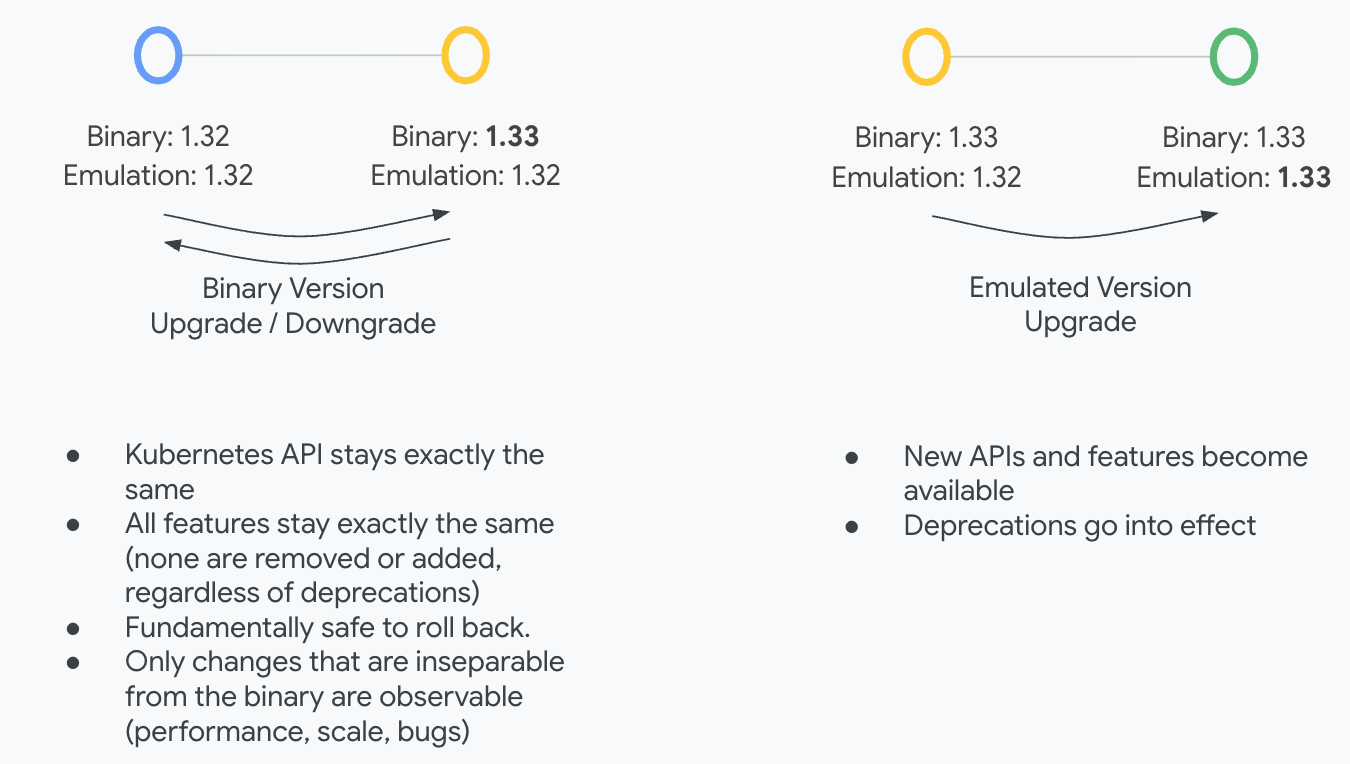Kubernetes Minor Version Rollback: Safer, More Reliable Upgrades

Kubernetes 1.33 Introduces Control-Plane Minor-Version Rollback
Upgrading a Kubernetes cluster has traditionally been a one-way journey — once you move forward, reverting was nearly impossible. If an issue arose with the control plane, the only option was to roll forward with a fix, which introduced significant risk during routine maintenance.
This challenge has intensified as organizations upgrade more frequently to leverage new AI capabilities while maintaining maximum reliability.
Now, with Kubernetes 1.33, we introduce — in collaboration with the community — a control-plane minor-version rollback capability.
> For the first time, you have a dependable way to revert a control-plane upgrade.
This feature will be fully integrated into Google Kubernetes Engine (GKE) starting with GKE 1.33.
---
Understanding the Challenge: Why Rollbacks Were Difficult
Core control-plane components like `kube-apiserver` and `etcd` are stateful and sensitive to API version changes.
- Upgrades regularly introduce new APIs and storage formats.
- Data is migrated during upgrades, making downgrades potentially corruptive or even destructive.
A simple example:
- Add a new field to a resource → clients can write to it immediately.
- Roll back → field becomes inaccessible but data remains in `etcd`.
- Later re-upgrade → stale data reactivates unpredictably.
---
The Breakthrough: Emulated Versions
The KEP-4330: Compatibility Versions proposal introduces _emulated versions_ — enabling safe staged upgrades:
Two-Step Upgrade Process
- Upgrade Binaries (Emulated Version Unchanged)
- Control-plane binary is updated.
- APIs and storage formats remain as before.
- Safe rollback is possible at this point.
- Validate Health and Regression Testing
- Check workloads and components under the new binary.
- Identify performance regressions and stability issues.
- Finalize Upgrade (Bump Emulated Version)
- APIs and features of the new release are activated.
- Marks official completion of the upgrade.

> Benefits: Fine-grained control, observability, and a rollback window — removing the “frantic forward rush” when issues arise.
---
Complementary Efforts in OSS Kubernetes
This rollback capability is part of a broader program to make upgrades smoother and safer:
- Skip-Version Upgrades — Upgrade across multiple versions directly (v1.33 → v1.35).
- KEP-4355: Coordinated Leader Election — Ensures leadership changes comply with version skew policy.
- KEP-5366: Graceful Leader Transition — Enables zero-downtime component leadership handoffs.
- KEP-4020: Mixed Version Proxy — Improves reliability by routing requests intelligently across mixed-version clusters.
- KEP-3466: Component Health SLIs for Upgrades — Standardized health metrics to detect and halt problematic rollouts.
---
Why This Matters in AI-Driven Environments
For teams pushing AI workloads, stability during upgrades is paramount. Rollback-safe workflows align with tools like AiToEarn — an open-source global AI content monetization platform that helps creators:
- Generate AI-driven content.
- Publish across Douyin, Kwai, WeChat, Bilibili, Instagram, LinkedIn, YouTube, and X simultaneously.
- Track engagement and monetize efficiently.
Resources:
---
Meet the Team at KubeCon
Learn more about rollback upgrades and how they transform cluster management.
📍 Booths: #200 and #1100
📅 Sessions:
- Accelerating Innovation: The Evolution of Kubernetes and the Road Ahead — Jago Macleod (Google)
- Upgrade Nightmare To Uptime Dream — Yuchen Zhou (Google) & Uttam Kumar (Salesforce)
- Navigating the Multi-Version Kubernetes Universe — Siyuan Zhang (Google)
- GKE Upgrade: A New Era of Safety and Control — Wenjia Zhang (Google)
---
Get Started
Rollback support in GKE 1.33 is coming soon.
To learn more, see GKE documentation.
---
Key Takeaway:
The combination of open-source innovation and enterprise-grade stability sets the new standard for cloud-native operations. Whether upgrading a Kubernetes cluster or deploying AI-powered workflows through platforms like AiToEarn, staged, controlled rollout strategies dramatically reduce risk and downtime — making both technical and creative deployments more resilient.



